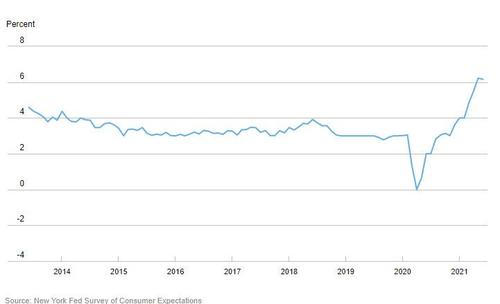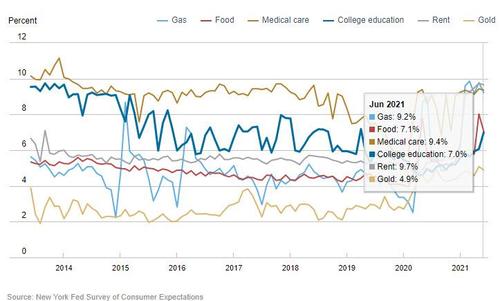Anything But Transitory: Consumers Expect Inflation In One Year To Soar To 4.8%
While central banks, tenured economists and the financial media are doing everything in their propaganda power to convince Americans that the current phase of hyperinflation is merely transitory (although it now appears that even the Fed is getting some doubts writing in its semi annual monetary policy report that inflation is “more lasting but likely still temporary” until proven otherwise, of course), the shocking reality on the ground is that the Fed has effectively lost control over near-term inflation expectations, as the NY Fed’s own survey of consumer expectations reveals.
According to the latest, June, installment of this closely watched survey, consumer inflation expectations for one year ahead, jumped by the most on record, surging by 0.8% in one month, from 4.0% in May to an all-time high for this series of 4.8% in June.
As the NY Fed details, “the increase in the short-term measure was driven mostly by respondents who have some college education. Our measures of disagreement across respondents (the difference between the 75th and 25th percentile of inflation expectations) reached new series’ highs at both horizons.”
There was some hope that the US won’t end up as Weimar in the Fed’s median inflation expectations for the three-year horizon which unlike the 1-Year spot, were little changed from prior month at 3.6%. Still, arguing that inflation at 3.6% in 3 years is acceptable to the Fed’s formerly dual mandate (which has since grown to Social Justice, Race, Gender Issues, Climate Change And Inequality), is at best laughable.
However, in a testament to just how sticky most Americans expect inflation to be, the most valuable (and widespread) middle-class asset – housing – is expected to rise at near record levels with the median year-ahead home price change expectations at 6.2% in June, substantially higher than its 12-months trailing average of 3.7%, if well below the current double digit pace of home price increase which has pushed the average home price to new all time high. According to the Fed, “Median year-ahead home price growth uncertainty—or the uncertainty expressed regarding year-ahead home price growth outcomes—increased and reached a new series’ high.”
Looking at a breakdown of inflation expectations by commodity, the median one-year ahead expected change in the cost of college education increased to 7.0% from 6.1% in May, its highest reading since April 2019. In contrast, the median expected changes in the price of food and gasoline decreased to 7.1% and 9.2%, respectively, from 8.0% and 9.8% in May. The median expected change in the cost of medical care and rent remained unchanged at 9.4% and 9.7%; elsewhere medical costs are expected to rise 9.36%; and rent prices will rise 9.66%.
Some other notable highlights from the survey: 9.59% (vs 9.69% in prior month), expect to not be able to make minimum debt payment over the next three months; the mtean perceived probability of losing one’s job in the next 12 months fell from 12.6% to 10.9%, hitting new series low which is to be expected in a country with record numbers of job openings.
Some more details from the Fed’s survey:
Labor Market
- Median one-year ahead expected earnings growth increased by 0.1 percentage point to 2.6% in June, its highest reading since the start of the pandemic (February 2020). The increase was driven by respondents who have at least some college education.
- Mean unemployment expectations—or the mean probability that the U.S. unemployment rate will be higher one year from now— decreased to 30.7% from 31.9%, a new series’ low.
- The mean perceived probability of losing one’s job in the next 12 months decreased from 12.6% to 10.9%, reaching a new series’ low. The mean probability of leaving one’s job voluntarily in the next 12 months also decreased to 18.6% from 18.7%, staying close to its trailing 12-month average of 18.1%.
- The mean perceived probability of finding a job in the next three months (if one’s current job were lost) increased by 0.2 percentage point to 54.2%, its highest reading since February 2020. The increase was driven by those with at least some college education. The series remains substantially below its 2019 average of 59.8%.
Household Finance
- The median expected year-ahead household income growth increased to 3.0% in June from 2.8%. The increase was broad-based across age, income, and education groups.
- Median household spending growth expectations increased by 0.2 percentage point to 5.2%, reaching a new series’ high. The increase was most pronounced for respondents with some college education.
- Perceptions of credit access compared to a year ago slightly improved. In contrast, expectations for future credit availability deteriorated, with more respondents expecting it will be harder to obtain credit in the year ahead.
- The average perceived probability of missing a minimum debt payment over the next three months decreased to 9.6% from 9.7%. The series remains below its 2020 average of 11.4%.
- The median expectation regarding a year-ahead change in taxes (at current income level) declined slightly to 4.6% from 4.7%.
- The mean perceived probability that the average interest rate on saving accounts will be higher 12 months from now increased by 0.5 percentage point to 29.9%. This is the highest reading of the series since May 2019. The increase was driven by those with an annual household income over $100,000.
- Perceptions about households’ current financial situations compared to a year ago deteriorated, with more respondents reporting to be worse off compared to a year ago. In contrast, respondents were slightly more optimistic about their households’ financial situations in the year ahead.
- The mean perceived probability that U.S. stock prices will be higher 12 months from now decreased by 0.5 percentage point to 40.2%, staying below its 2020 average of 44.3%.
Tyler Durden
Mon, 07/12/2021 – 12:59![]()
Zero Hedge’s mission is to widen the scope of financial, economic and political information available to the professional investing public, to skeptically examine and, where necessary, attack the flaccid institution that financial journalism has become, to liberate oppressed knowledge, to provide analysis uninhibited by political constraint and to facilitate information’s unending quest for freedom. Visit https://www.zerohedge.com


